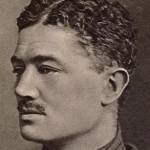Fighting in mud, we turn to Thee,
In these dread times of battle, Lord.
To keep us safe, if so may be,
From shrapnel, snipers, shell, and sword.
But not on us, for we are men
Of meaner clay, who fight in clay,
but on the Staff, the Upper Ten,
Depends the issue of the Day.
The staff is working with its brains,
While we are sitting in the trench;
The Staff the universe ordains
(subject to Thee and General French).
god help the staff-especially
The young ones, many of them sprung
From our high aristocracy;
Their task is hard, and they are young.
O Lord, who mad'st all things to be,
And madest some things very good,
Please keep the Extra A.D.C.
From horrid scenes, and sight of blood.
See that his eggs are newly laid,
Not tinged as some of them-with green;
And let no nasty draughts invade
The windows of his Limousine.
When he forgets to buy the bread,
When there are no more minerals,
Preserve his smooth well-oiled head
From wrath of caustic Generals.
O Lord, who mad'st all things to be,
And hatest nothing thou has made,
Please keep the Extra A.D.C
Out of the sun and in the shade.




















Comment form: